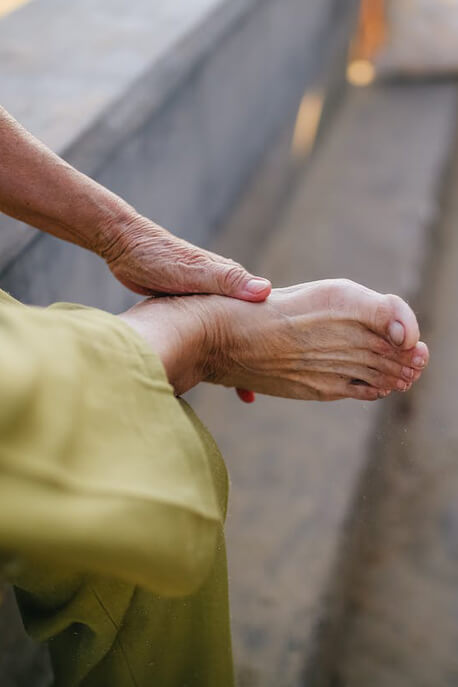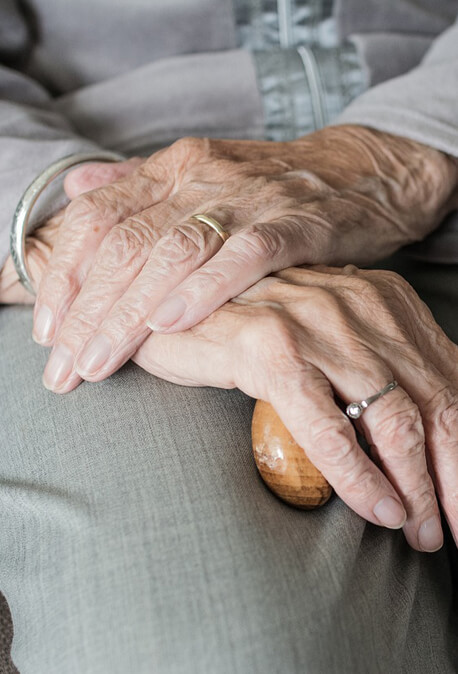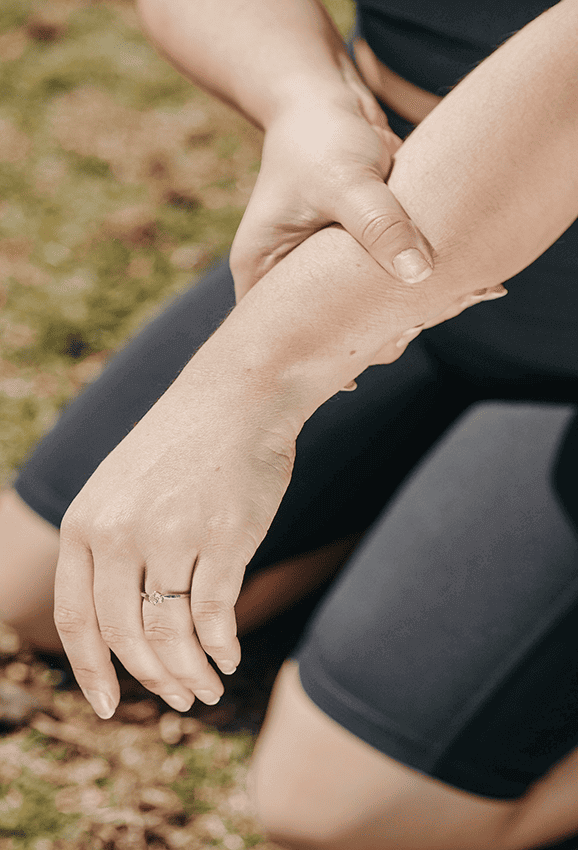Numbness Treatment in Sioux Falls
It can be challenging for those with numbness in fingers or numbness in feet and legs to navigate everyday life. So many of our daily activities rely on our sense of touch.
What causes numbness? How does it affect daily activities? And what can be done to improve your symptoms? Our team at Axiom Chiropractic & Neuropathy is here to help you understand and get treatment for this condition.
What Causes Numbness?
Your body couldn’t function without a vast network of nerves that feed information to the brain. It tells us if we’re upright or lying down, moving or still, hot or cold, comfortable or injured. Nerves let us experience textures like rough or smooth, wet or dry, flat or rounded.
The nerves travel from every area of skin, organ, muscle, and bone up through the spinal column to the brain. The brain and spine are called the central nervous system, while the nerves radiating from the spine to other body parts are called peripheral nerves. Damage to any of the peripheral nerves is called peripheral neuropathy.
Damage interrupts the signals traveling to the brain. If the signal gets corrupted, you can experience tingling, buzzing, stabbing, burning, pressure, or temperature changes. When the signal is cut off, and the brain doesn’t get any information, you feel numb, like you’re wearing a sock on your hand or foot, and you’re never quite able to feel an object right.
Numbness in fingers and feet can be a temporary side effect of damage, or it can be permanent. It depends on the type of damage, how long it’s allowed to continue, and what corrective measures you take.


Types Of Nerve Damage
Healthy nerves need four things to thrive.
- Blood flow
- Oxygen
- Nourishment
- Unrestricted movement
If you remove any of the four elements, the nerve gets damaged and can die. Some of the common causes of neuropathy include:
- Diabetes: Prolonged elevated blood sugar levels damage blood vessels, like rust damaging metal. You usually notice numbness in feet and legs first as they are farthest from the source of blood. The tiny blood vessels that feed those nerves quit supplying blood, oxygen, and nourishment to the nerves.
- Genetics: Sometimes, people are born with a degenerative disease that attacks the nerves.
- Nicotine and Alcohol: Both nicotine and excessive alcohol consumption constrict blood vessels, starving nerves.
- Nutrient Deficiencies: Some nutrients help with nerve health and regeneration, while others promote conductivity. Without the proper nutrition, the nerves can die.
- Infectious Disease: Several viral or bacterial infections can lead to peripheral neuropathy, like Lyme disease and HIV.
- Autoimmune Disease: Our immune systems attack foreign bodies like toxins, viruses, bacteria, and parasites. Sometimes, the immune system stays in overdrive long after eliminating the threat and starts attacking healthy tissue, including the myelin sheath protecting your nerves. Examples include lupus, multiple sclerosis, and fibromyalgia.
- Trauma: Hand and foot numbness can also come as a direct result of sustained or sudden trauma. The damage may be minor or severe, depending on the cause. The severity of the trauma and treatment decide if the damage is permanent or reversible.
How Can Foot Numbness And Numbness In Hands Affect Daily Life?
Feet
Foot numbness can cause you to lose your balance. Nerves running through your legs and feet send constant feedback to the brain about the terrain. Is it rocky, uneven, tilted, or smooth? How did your foot strike the surface? Did unevenness cause you to compensate? Will you tip? What kind of micro adjustments need to happen to stay upright?
When your feet are numb, however, you must rely on visual or auditory cues to tell you that you’re falling. It takes longer to get the message to the brain. Delayed reaction times can lead to nasty falls.
Numbness can also prevent you from feeling an injury to your feet. If you step on a nail or a piece of glass and can’t feel the injury, the wound is open to bacteria that can cause an infection. If you have neuropathy from blood flow issues or immunity disorders, you may have difficulty healing, which encourages the bacteria to grow and spread. Infections can seriously damage your feet and can poison your body if left untreated. Tissue damage can lead to necrosis (dead tissue) and amputation.


If you have peripheral neuropathy, you should inspect your feet daily for injuries and monitor them carefully. Keep them clean and dry, use antibiotic ointment, and wear comfortable, well-cushioned shoes.
If you notice a wound that isn’t healing, visit your doctor. If the red area around the wound starts to spread or you develop a fever, chills, muscle weakness, abnormal or rapid heartbeat, confusion, or other signs of blood poisoning, go to the ER immediately.
Hands
At our clinic in Sioux Falls, we find numbness in fingers affects functionality. You may find it difficult to button your shirt, tie your shoelaces, write, pick up small objects, open pill bottles, and do other movements that require manual dexterity. This can be extremely frustrating as you are forced to rely on others for ordinary tasks.
Numbness also poses a danger when you’re working with machinery, cooking, or dealing with extreme cold. You may not notice an injury immediately. Prolonged exposure could worsen the injury, leading to longer recovery times and sometimes permanent damage.
Seeking Numbness Treatment In Sioux Falls
Treatment usually starts with the underlying cause. If you can treat the underlying cause and do so early, there’s a chance the damage is reversible. It depends on how long the damage was allowed to continue and the severity of the condition before treatment.
Fixable Underlying Causes
- If you have diabetes, then you must get your blood glucose levels regulated so the blood vessels can repair themselves and feed the nerves. If you don’t have a constant monitoring device and insulin pump, check your glucose levels regularly and address fluctuations immediately. Concentrate on a low-glycemic diet and get daily exercise.
- Your provider can do an evaluation to determine if you have any nutrient deficiencies. Some fat-soluble nutrients can be toxic at high levels, so it’s best to wait for prescribed doses rather than make dramatic changes on your own.
- Those with neuropathy caused by alcohol or nicotine must quit using those substances if they want to see improvement. It’s easier said than done if you’ve been drinking or using nicotine for a long time. There are medical interventions that help with withdrawal symptoms and addiction recovery programs should you or your loved one need help.
- Infections can be treated with antibiotics or antiviral medications.
Of course, genetic conditions and autoimmune diseases are more challenging to treat, but that doesn’t mean you can’t see symptom relief.
Traditional Medicine
Traditional medicine will then move to medication to treat neuropathy symptoms. Commonly used drugs include antidepressants and anti-seizure medications. Unfortunately, while you may see some initial relief, medication masks symptoms rather than going after the root problem, the ongoing source of damage. The nerves are restricted or lacking in nourishment, oxygen, and healthy blood flow. Not only do medications fail to address these conditions, they all have a long list of side effects that can complicate recovery.
These side effects may include:
- Cardiopulmonary distress: Difficulty breathing, heart attack, irregular heartbeat, racing heart, stroke
- Cognitive distress: Agitation, confusion, depression, dizziness, grogginess, hallucination, loss of consciousness, nightmares, suicidal thoughts
- Gastrointestinal distress: Constipation, diarrhea, nausea, vomiting blood
- Motor dysfunction: Inability to move or speak, loss of balance, muscle weakness, peripheral neuropathy, uncontrolled muscle and eye movements
- Sexual dysfunction: Erectile dysfunction, inability to orgasm, loss of sexual desire

Our Approach To Numbness Treatment
Regardless of the catalyst, we work to correct the internal environment so nerves can heal. Axiom Chiropractic & Neuropathy takes a holistic path to wellness. After performing a thorough exam to find the causes of your condition and getting a detailed medical history, your team will develop a unique plan that best fits your needs. Every patient is unique. There are no cookie-cutter solutions.
The goal is to:
- Improve blood vessel repair and encourage new growth
- Increase oxygenation and nutrient exchange for malnourished nerves
- Identify deficiencies in nutrition for improved nerve regeneration and conductivity
- Ease neuropathy symptoms for more comfort
- Develop improved balance, motor function, range of motion, and strength
Take-Home Therapies: While some techniques are only possible in the office, some patients may be able to do certain therapies in the comfort of home. At-home therapy can save you the cost of multiple visits, excessive time off work, and child/adult care. If you are a good candidate for at-home therapy, we will provide you with all of the information and techniques you will need.
Education And Tools: In addition to symptom relief, we want to help you avoid loss of balance issues. Foot numbness causes injuries ranging from broken bones to head wounds. Life should be enjoyed to the fullest. No one should avoid recreation or family and friend gatherings for fear of a nasty fall. We want to give you the tools to reclaim your independence while working to regain physical sensation.
Don’t Delay Treatment
You deserve the best care for numbness treatment that Sioux Falls has to offer. Seek help as soon as possible to avoid complications. Untreated nerve damage can cause permanent harm. Dead nerves don’t regrow, but the proper environment allows damaged nerves to heal themselves. For more information or to schedule an appointment, call (605) 275-2010.
DISCLAIMER: THIS ARTICLE DOES NOT PROVIDE MEDICAL ADVICE
The information, including but not limited to, texts, graphics, images, and other material contained in this article are for informational purposes only. None of the material mentioned is intended to be a substitute for professional medical advice, diagnosis, or treatment. Always seek the advice of your physician or other qualified healthcare provider with any questions you may have regarding a medical condition or treatment and before undertaking a new care regimen. Never disregard professional medical advice or delay in seeking it because of something you have read in this article.
